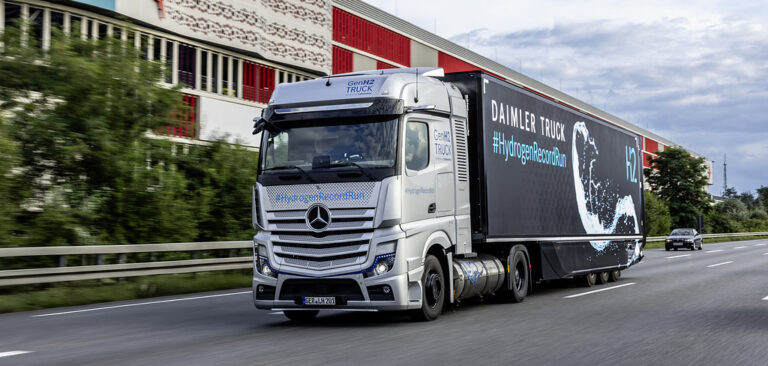Daimler Truck says it has successfully demonstrated the potential of hydrogen fuel-cell technology for decarbonizing long-haul road transportation with a public road-approved prototype of the Mercedes-Benz GenH2 Truck, which has covered a distance of 1,047km with a single fill of liquid hydrogen.
The truck, powered by a cellcentric fuel-cell system and equipped with a liquid hydrogen fuel tank system, embarked on its journey on the afternoon of September 25 at Mercedes-Benz Truck’s Customer Center in Woerth am Rhein and reached its destination in Berlin on the morning of September 26. The truck completed the run fully loaded with a gross combined vehicle weight of 40 tons under real-life conditions. This record-breaking achievement, with sealed tanks and verified mileage, was independently confirmed by TÜV Rheinland.
After the successful record run, Andreas Gorbach, a board member of Daimler Truck and head of truck technology, drove the truck across the finish line in Berlin. He highlighted the importance of both battery-electric and hydrogen-powered drive technologies in decarbonizing transportation.
Gorbach said that fuel cell trucks excel in flexible and demanding long-haul transportation tasks and that breaking the 1,000km mark with a single fill demonstrates the viability of hydrogen as a clean energy source for trucks. He also emphasized the need for a green energy infrastructure and cost competitiveness to accelerate the transition to emission-free transportation.
Before the run, the truck was fueled with renewable liquid hydrogen at Daimler Truck’s filling station in Woerth. The hydrogen, supplied by Air Liquide, was produced from biomethane with guarantees of origin. Cryogenic liquid hydrogen at -253°C was filled into two 40kg tanks on the truck chassis. Thanks to efficient insulation, the hydrogen could be stored at the required temperature without active cooling, and TÜV Rheinland sealed both tanks before the start of the #HydrogenRecordRun.
Daimler Truck’s preference for liquid hydrogen in hydrogen-based drives is due to its significantly higher energy density compared to to gaseous hydrogen, enabling longer range and performance comparable to conventional diesel trucks.
Daimler notes that while battery-electric trucks are suitable for distribution and long-haul routes with charging options, hydrogen-based drives are better suited for flexible and demanding heavy-duty transportation and long-distance haulage. It believes that a successful transition to emission-free technologies requires both hydrogen and battery-powered vehicles, supported by appropriate infrastructure and sufficient green electricity.


